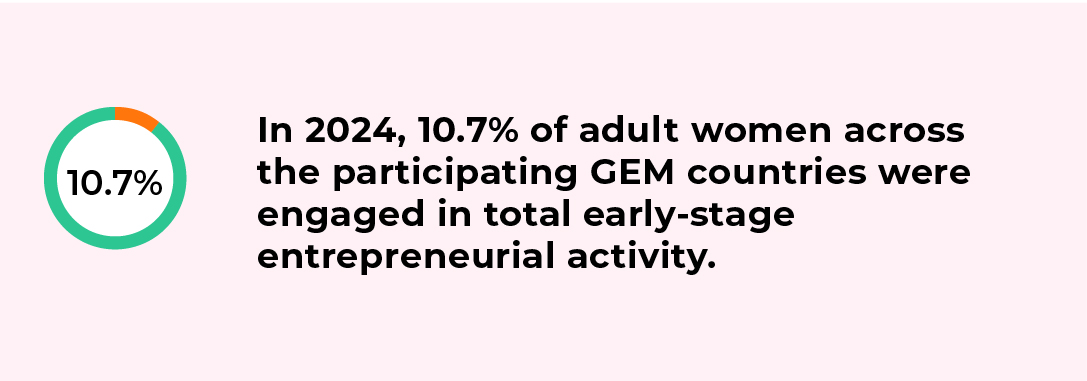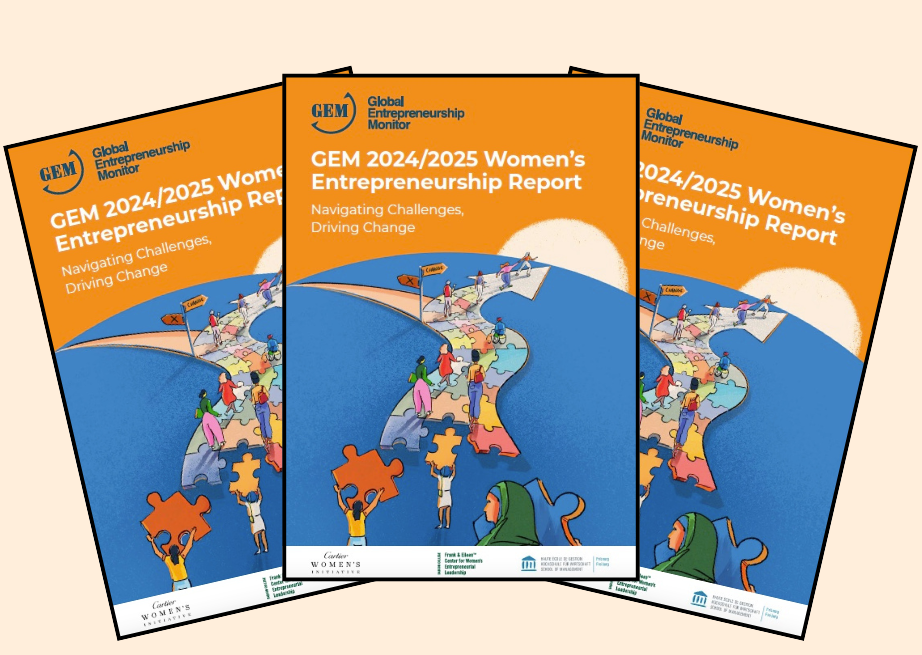19 November 2025, London, UK – The new Global Entrepreneurship Monitor (GEM) 2024/2025 Women’s Entrepreneurship Report: Navigating Challenges, Driving Change shows that while women continue to demonstrate resilience and innovation, they still face persistent barriers that limit their full participation in the entrepreneurial ecosystem.
This year’s report – drawing on insights from 161,528 adults across 51 countries – highlights several of these barriers, including the reasons women and men give for closing a business. In 2024, 3.4% of women globally reported closing a business, compared with 3.8% of men. The top reasons cited by women were:
- Business not profitable (29.4%)
- Family or personal reasons (21.0%)
- Problems getting finance (16.2%)
For men, the top three reasons were:
- Business not profitable (30.3%)
- Another opportunity, such as a job, retirement, or school (17.1%)
- Problems getting finance (16.1%)
Family or personal reasons ranked fourth among men at 14.3%. This means women were 47% more likely than men to close a business for family or personal reasons, underscoring the ongoing tension many women face in balancing entrepreneurship with caregiving and household responsibilities.
“This pattern suggests that for men, entrepreneurship is more often a voluntary choice among several viable options, rather than the only option, particularly in contexts where formal employment is limited and affects women more starkly than men,” noted the report authorship team consisting of seven GEM researchers from six different countries.
Another barrier relates to investment. Women were 2.5 times more likely to invest in women than men investors. Two-thirds of informal investments went to men, suggesting that women remain underrepresented as both investors and recipients of investment.

Other findings include:
- One in ten women compared to one in eight men started new businesses in 2024.
- Among startups bringing new innovations to market, women were at parity with men or higher in 18 of 51 countries.
- Women’s startup rates were up in 19 of the 47 countries participating in both 2023 and 2024 surveys, most notably in Jordan and Morocco where rates have doubled.
- Women were less than half as likely as men to be active in the internet technology sector (ICT) and 11% less likely to see the benefits of AI for their business.

The report offers six evidence-based recommendations for policymakers and ecosystem leaders:
1. Tailor support for diverse entrepreneurial contexts by addressing the cultural and economic challenges facing women entrepreneurs.
2. Facilitate business continuity and scaling by providing mentorship and training to overcome barriers.
3. Support women in high-potential sectors through STEM education and targeted accelerators.
4. Integrate psychological well-being and resilience support.
5. Promote digital and AI adoption through tailored digital literacy and AI-integration programmes to help women-owned businesses adopt transformative technologies.
6. Broaden investment networks by incentivising women to participate as angel investors and strengthen women-focused investment networks to ensure women entrepreneurs are both investors and investees.
“GEM consistently shows that women remain underrepresented in entrepreneurship and face major barriers to scaling,” said Aileen Ionescu-Somers, GEM Executive Director. “It is time to address the financing gaps, social pressures, and structural obstacles that hold women back. We must invest in women-focused entrepreneurship ecosystems, strengthen their capabilities and confidence, and move beyond one-size-fits-all approaches that ignore local realities.”
The GEM Women’s Entrepreneurship Report is sponsored by the Cartier Women’s Initiative; The School of Management in Fribourg, Switzerland; and the Frank & Eileen™ Center for Women’s Entrepreneurial Leadership at Babson College.
Download the report and access the launch report webinar recording.
About GEM
Global Entrepreneurship Monitor (GEM) is a consortium of national country teams, primarily associated with top academic institutions, that conducts survey-based research on entrepreneurship worldwide. GEM is the only global research source that collects data directly from individual entrepreneurs.
In numbers, GEM is:
• 25+ years of data
• 150,000+ interviews annually
• 120+ economies
• 370+ entrepreneurship researchers
• 150+ academic institutions
• 150+ funding institutions
GEM began in 1999 as a joint initiative between Babson College (USA) and London Business School (UK). More information is available at http://www.gemconsortium.org.
Media Contact
Kevin Anselmo, GEM Communications
kanselmo@gemconsortium.org
Tel: +1 919 260 0035

